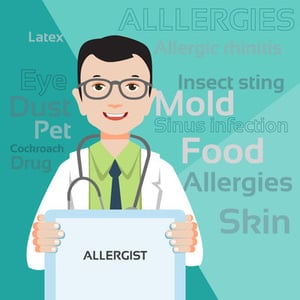Allergies in Houston? Why You Might Need to See an Allergist?
February 15th, 2019 | 4 min. read


There are nearly 67 million people in the U.S. who suffer from allergies. Of those, nearly 81 percent report specific allergies to pollen. For those suffering from pollen allergies in Houston, allergy season is long and unforgiving, often lasting from January through September. That is in addition to the many other allergens that are far too common in and around Houston.
What are the Common Allergies in Houston?
If you are one of the many Americans who suffer from allergies, odds are good that you may need to seek the services of an allergist at some point along the way. You may even be asking yourself right now how to find an allergist near me. Because the winters are mild and short-lived around Houston, many allergens that are seasonal in other parts of the country may feel as though they are year-round occurrences for those living in Houston.
The more severe the reactions, the longer the seasons seem to last. Symptoms of seasonal allergies, while often unpleasant, and sometimes interfering with your overall quality of life, are not always serious. However, they can be linked to more serious conditions, like asthma and sinus infections.
Aside from pollen, which comes from a surprising assortment of local trees, allergy attacks can also be triggered by a variety of grasses and molds. Unfortunately, it’s not possible to walk around protected from these allergens by a bubble of filtered air. The solution is to seek medical solutions to your allergy problems, so they do not interfere with your quality of life.
What is an Allergist?
The American Academy of Allergy Asthma and Immunology provides an allergist definition as physicians who have specialized training to diagnose, treat, and manage a variety of conditions, including:
-
Allergies
-
Asthma
-
Immunologic disorders
The official title is as an allergist/immunologist and the field of medicine requires nine years of additional study beyond a bachelor’s degree. Physicians who desire to work in this specialty are expected to complete two years of fellowship studies in an appropriate allergy/immunology training program as well.
What Does an Allergist Do?
An allergist in Houston treats many conditions associated with allergies, immunology, and respiratory health, including allergic reactions, hives, hay fever, sinusitis, asthma, eczema, and immune disorders known to cause infections.
As a new patient, you can expect to answer a wide range of questions during an initial visit with an allergist. These questions are designed to help allergists familiarize themselves with the specific nature of your condition.
This helps not only with the diagnostic process by narrowing down the types of substances patients may be allergic to, but also to introduce specific symptoms patients are experiencing, so they can be treated.
Because allergists are trained to get big picture information before making a diagnosis or beginning treatment, expect to answer questions about your family history, the nature of your symptoms, how long you’ve experienced them, and the overall state of your health aside from your allergies.
Not only will your allergist use this information to learn about the nature of your allergies, but also to help create an individualized treatment plan to meet your unique needs.
What to Expect During Your Visit
Beyond the questionnaire and deep dive into your symptoms and medical history, your allergist might conduct a physical examination of you, especially if you have skin symptoms you’d like to discuss, such as rashes, itchy skin, etc.
If your allergist believes your symptoms indicate allergies as the primary culprit, he or she will likely wish to conduct an allergy test to identify specific allergies you may have. You may not go through a full spectrum allergy test, but rather test for specific allergies based on your history, and the types of allergens you’re likely exposed to at home and work. For instance, your allergist may ask you to take a skin allergy test to determine what allergies you have.
Your allergist will create an allergy treatment plan designed specifically to meet your needs based upon the results of your test and physical exam, along with the questions your allergist asked about family history, daily exposures, etc.
Most treatment plans do not involve a single treatment, but rather a combination of treatments, that include things like:
-
Avoidance therapy. Involves identifying things you can do to reduce your exposure to certain allergens, such as changing your habits to avoid specific trees or plants along your route, reducing dust and pollen inside your home, getting rid of trees on your property that may trigger attacks, etc.
-
Non-medical treatments. Things you can do to ease your symptoms without resorting to medications. This includes things like using nasal rinses and eye drops and even using filters on vacuum cleaners or a whole house filtration system.
-
Pharmaceutical treatment options. Sometimes the symptoms are severe enough that prolonged medication is required as a preventative tool to help you avoid allergy symptoms. However, you may only need medications as needed when allergy symptoms are at their most severe.
-
Allergy shots. For those who have life-threatening or severe quality of life-limiting allergies, allergy shots may be a necessary consideration. However, this is usually reserved for advanced allergy cases and will not likely be a first choice for addressing your allergy problems.
Of course, different treatment options may be recommended for specific issues that may resemble allergies, like sinus infections that may require medication for treatment or asthma, which may require rescue inhalers and more aggressive avoidance techniques; and conditions like hives or eczema, which may require topical treatments in addition to medications.
Your allergist, however, if your first line of defense against the symptoms of these conditions especially if your allergies are impacting your quality of life. If it turns out you have allergies, however, treatment can not only help improve your symptoms, but in many cases can put your allergies into remission.
When Should You See an Allergist?
While not all allergies and hay fever types of conditions are serious enough to warrant a visit with an allergist, if you find that your symptoms are limiting your enjoyment of everyday activities, forcing you to alter family plans during certain seasons, or interfering with your ability to function efficiently at work or school, perhaps it is time to schedule an appointment with your allergist here at Houston ENT & Allergy.
Additionally, if your symptoms are severe and pronounced, or you can’t figure out what might be causing the reaction, your allergist can work with you to help identify the exact cause of your discomfort and irritation so you can create an effective plan for managing your symptoms and avoiding exposure (if possible) in the future.
It’s no longer necessary to suffer from your allergy symptoms needlessly. This is especially true today when there are so many effective methods of treatment available to address them and help you get back into the game of life.
Schedule your visit with a Houston ENT & Allergy allergist today to learn more about the types of allergies you may have, treatment options that can help you overcome the symptoms that are bringing you down, and the things you can do that will limit your exposure to the worst Houston area offenders. With the right allergy treatment, most people can live lives that are virtually symptoms free.
Patricia A Leonard, MD is Board Certified in Allergy and Immunology, and has been practicing allergy treatments in the Houston community for 10 years.
